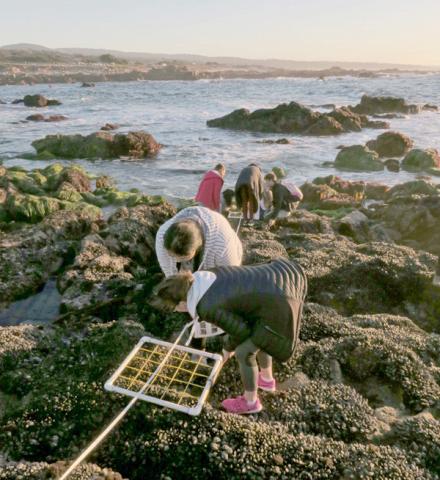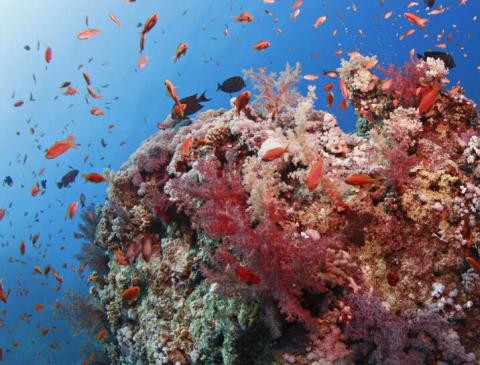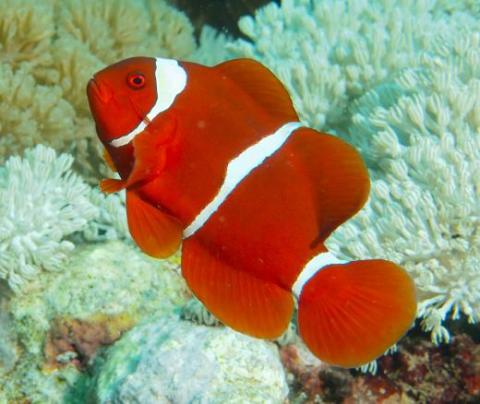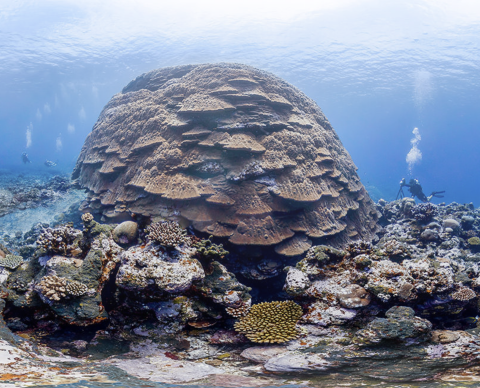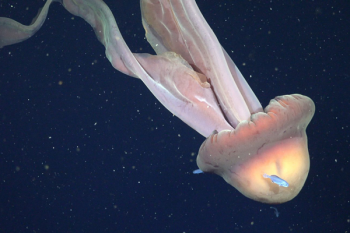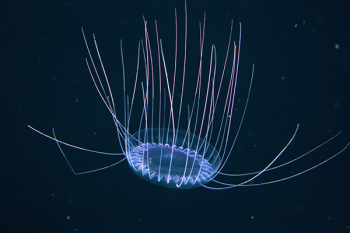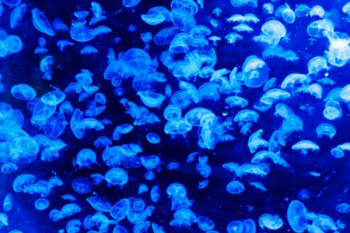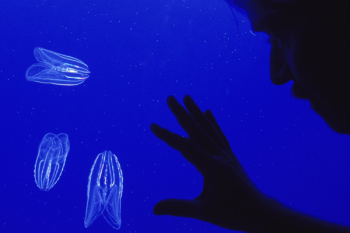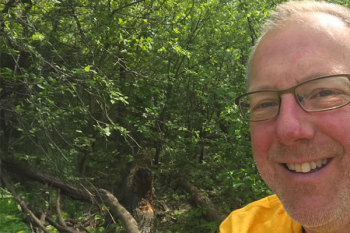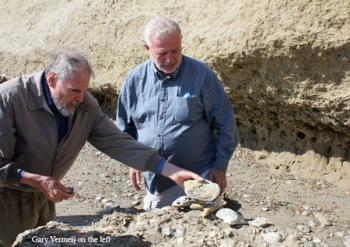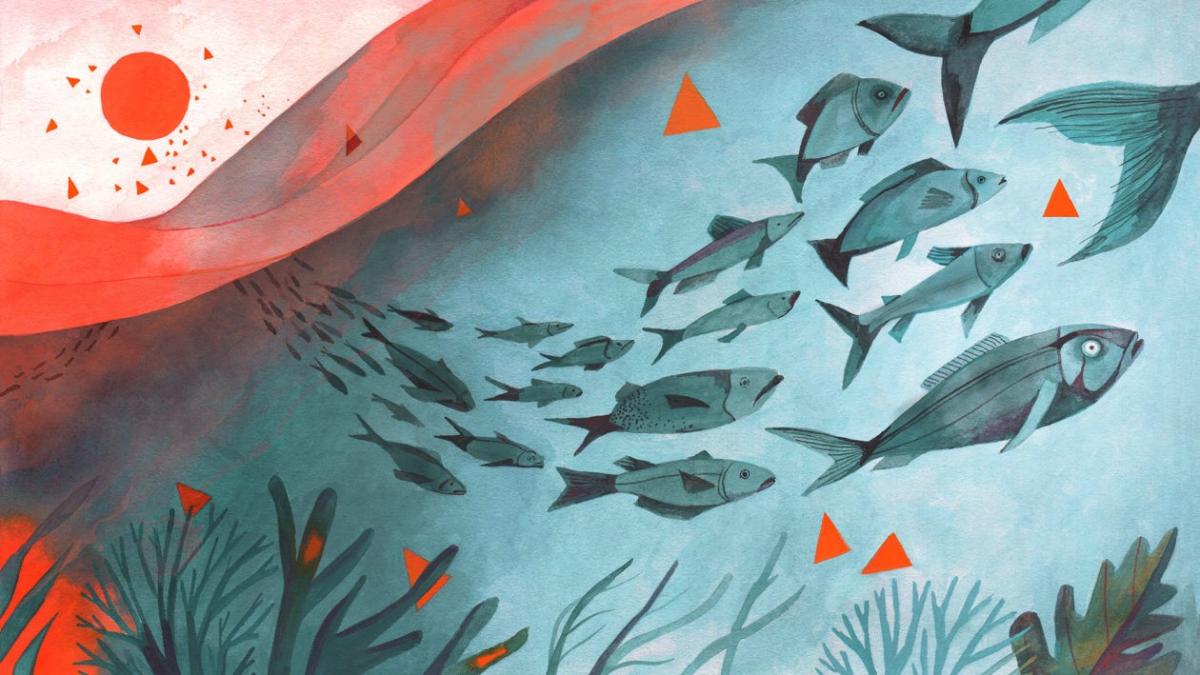
We know that global warming is forcing many animals around the world to flee their normal habitats, and now an exhaustive analysis has shown marine species are heading for the poles six times faster than those on land. But many species can’t move and scientists think we’re on the verge of a mass extinction of marine life not seen since the demise of the dinosaurs. There are many ways that warming is affecting species and more are coming to light each year.
Community Changes
The IPCC Report on the Ocean (2019) summarized for policy makers : ”Ocean warming has contributed to observed changes in the biogeography of organisms ranging from phytoplankton to marine mammals, consequently changing community composition, and in some cases, altering interactions between organisms.” The movement of some tropical species northward has led to increased grazing on some coral reefs, rocky reefs, seagrass meadows, and open-ocean ecosystems, leading to altered ecosystem structure.
Phytoplankton are the foundation of most food webs in the ocean, and their productivity drives healthy marine ecosystems and commercial fisheries. Changes in the distribution of phytoplankton communities driven by ocean warming is creating changes in the primary production of the ocean causing massive impacts everywhere.
An examination of how four key groups of phytoplankton will respond to ocean temperatures forecast to occur between 2080 and 2100 suggests that their growth rates and distribution patterns will likely not be the same, resulting in significant implications for the future composition of marine communities around the globe. A warming ocean means some plankton moving north, not a good sign for ecosystems. With so many species on the move, marine communities are reshaping.
If species can’t migrate easily to cooler waters, researchers predict that their ecological communities will end up dominated by smaller, less nutritious species. This could be a dire problem for the local fishing industry. For example, a study that looked at ocean sediment cores from a past warmer period off Peru found smaller species of fish. If the Peruvian anchovy collapsed because of climate change, it would be disastrous.
Scientists in Australia found that areas of high marine biodiversity are disproportionately exposed to future warming. These hotspots of biodiversity are in the tropics and contain coral reefs. To escape increasing ocean temperatures, the animals in these places would have to move and: “In many cases this will require moving distances beyond the oceanic regions that these species evolved in and are adapted to, at rates of movement rarely seen for marine life,” said Dr Stuart Brown.
A warmer ocean isn’t a problem for all species. As the oceanic food webs shift, cephalopods are adapting and thriving, becoming the dominant species in many places.
Species moving
Lobsters may be finding the Gulf of Maine too warm, not good news for lobster fishing. Here’s our blog about that.
Jumbo squid are also finding waters too warm for them, contributing to the collapse of the squid fishery in the Gulf of California.
Fish moving to cooler waters impacts fishing communities. This report has good graphics about flounder on the move and what that means for those who depend on fishing them for a living.
Warming waters are causing fish in Icelandic waters to move north “Ocean temperatures around Iceland have increased between 1.8 and 3.6 degrees Fahrenheit over the past 20 years.” Fishing communities are struggling as the fish, especially capelin, have moved to cooler waters.
But, the ocean doesn't warm uniformly, so local conditions drive fish movements as well. In some places, there may be pockets of cooler water south, so fish move there. For example, in the Gulf of Maine, some species are moving southwest and closer to shore to find cooler waters.
Population declines and local extinctions are occurring because of the warming ocean; this takes many forms. Some species that can’t move any more are trapped with no place to go or are facing local extinctions. This research found that of the marine species they studied, 56 percent experienced a range contraction due to global warming, compared to 27 percent of the land species.
The changes in the ocean are destroying some populations. The waters of the Gulf of Maine are warming faster than almost anywhere on Earth. Data collected over two decades, including numbers of five species of mussels, barnacles and snails, show that all have been experiencing declines – some slow, some more rapid – in part due to climate change.
A fossil study from Stanford University finds the diversity of life in the world’s oceans declined many times over the past 145 million years during periods of extreme warming because warmer ocean waters holds less oxygen. Temperatures that make it hard for cold-blooded sea creatures to breathe have likely been among the biggest drivers for shifts in the distribution of marine biodiversity. The study suggests that ocean biodiversity increases exponentially with sea surface temperature up to about 20-25 C (68-77 F). Beyond that threshold, biodiversity drops because as temperatures rise, water’s oxygen content falls, while animals’ need for oxygen grows.
For animals that migrate, like gray whales, food may be scarce causing malnutrition and death.
Warming waters are impacting some ancient animals: the water temperature in the ocean layer, defined as the Mesophotic Zone, through which the chambered nautilus travels, is growing so warm that they may simply have fewer places to go to stay cool enough.
The Southern Ocean
A long-term study in the Southern Ocean reveals a correlation among warming waters, decreased sea ice and reduced abundance of Antarctic silverfish, a key forage fish. These fish could disappear from the region entirely, triggering major changes in the marine ecosystem."
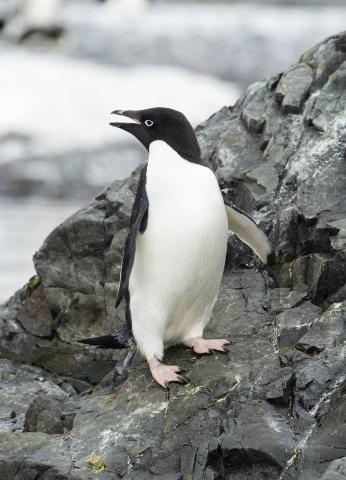
The population of Adelie penguins on the western side of the Antarctic Peninsula is decreasing dramatically due to a warming climate. As ice is melting there, krill that the birds depend on are in steep decline. But on the eastern side of the Peninsula, the population is doing well because the Weddell Sea has remained icy and cold with abundant krill. Climate warming that is melting ice threatens another Antarctic penguin – the Emperor penguin. These penguins are dependent on sea ice, pack ice and also ice on land for breeding. Scientists predict that 98% of the population will be gone unless we curb greenhouse gas emissions.
Other Changes
Climate change will affect fish sizes in unpredictable ways and, consequently, impact the complex food webs in our oceans. A study analyzed three decades of data from surveys of rocky and coral reefs around Australia. The results show that with higher temperatures the average fish body size got smaller as predicted (around 55% of species), but in others, it increased (around 45%). In general – but not universally – larger species tended to get even bigger in warmer waters, while smaller species tended to get smaller.
Scientists have studied coral reef fish responses to marine heatwaves. They found changes in gene expression that signal a higher demand for energy and oxygen.
Disease
Disease outbreaks, most likely made worse by warming waters, have hit a variety of species. For example, a bacterial disease that affected the shells of lobsters appeared after almost a decade of ocean warming, causing a collapse of the fishery in southern New England.
Sea star wasting disease decimated more than 20 species of sea stars on the west coast in 2013-2014, including the iconic sun star. Although many factors seem to contribute to the disease, scientists found that the disease was caused by a complex interaction between microbes and the environment including warming ocean waters. In Southeast Alaska in 2020, the sea star species thought to be unaffected by the disease are present (primarily Henricia leviuscula/blood star and Dermasterias imbricata/leather star). Bu the ones affected are still absent.
